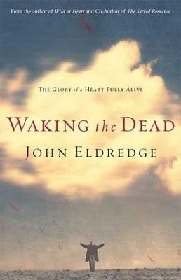Waking the Dead
 Waking the Dead performs a necessary surgery for me. It peels back layers of resignation and hopelessness and returns me to the true gospel, the true good news: Jesus came to give us abundant life, and if I’m missing that, I shouldn’t settle for the status quo.
Waking the Dead performs a necessary surgery for me. It peels back layers of resignation and hopelessness and returns me to the true gospel, the true good news: Jesus came to give us abundant life, and if I’m missing that, I shouldn’t settle for the status quo.
I’ve read this book before. A few years ago my husband was introduced to Wild at Heart: Discovering the Secret of a Man’s Soul, and I read that book, this one, Epic: The Story God Is Telling, and Captivating: Unveiling the Mystery of a Woman’s Soul before surrendering in sheer exhaustion. I guess it’s obvious that there’s something in John Eldredge’s books that speaks to me. This one remains my favorite (and it’s not only because Eldredge draws liberally from a number of my favorite books and movies — LOTR, Narnia, Phantastes — but that doesn’t hurt!).
Here’s the summary from the Ransomed Heart Ministries website:
Waking the Dead explores the power of God’s New Covenant with us – the power to restore our hearts and set them free. For the heart of the believer no longer wicked – it is good. Your heart is good. How God restores us is usually experienced through Four Streams: Counseling, Healing, Walking with God, and Spiritual Warfare. This is how we discover that “the glory of God is man fully alive” (St. Irenaeus).
I struggled off and on in this reading with feeling like Eldredge’s insistence that “your heart is good” was gimmicky. But he is coming against what he feels is an established and virulent confusion of the “desperate wickedness” of the fallen heart with the condition of the new heart God gives to the restored believer. When we believe our hearts are “bad” even after we’re saved, he reasons, we give up, and settle for a dull and semi-anesthetized life of church attendance, sin management, and blindness to much that the Bible promises about the vividness and joy and power of the Christian life here and now.
Not everyone will relate to this, but I do. I felt this book gave me some conceptual tools I needed to distinguish between the reality of my place before God, and the things I tend to believe (lies of the deceiver, according to Eldredge) about it. I go to church, read my Bible, take care of my family, feel lonely and “nicheless” a lot, and shrug off the idea of life being glorious as “metaphorical.”
What Eldredge has to say about “fellowships of the heart” stirs a longing in me for a circle of friends like he describes. It did last time I read it, too, and at the time I was in a circle that seemed to offer some promise. But it didn’t work out that way, and it was poignant to remember as I re-read. “Listen carefully,” Eldredge writes, “any movement toward freedom and life, any movement toward God or others, will be opposed. Marriage, friendship, beauty, rest — the thief wants it all.” I guess I would agree.
I hunger for the kind of community he describes here, one that isn’t formed through a program. When I was a child growing up in the church, my parents were always involved in one Bible study or another. My mother helped with Sunday school. My father sang in the choir after he was saved when I was around 5. But in addition to this kind of programmed social life, they were included in a circle of folks from church who just enjoyed doing things together: canoe trips, camping and hiking, making apple butter in the fall. It was a large, flexible, open pool of people, not a clique. They were at different stages of life. When someone needed help with a project, the others were there. I observed faith that was not done in isolation, not done only inside church walls, and that felt connected to others and to much of the beauty of God’s world.
I’ve never found that since. “Your life is at the narrow part of the hourglass,” my dad has reminded me, and he’s right. We have young children who need care. Family life takes a lot of energy. We don’t have a babysitter.
But my parents were at the narrow part of their hourglass too in those days. I’ve always figured it’s because I’m more internal, or not as likable, or for some mysterious reason unworthy of that kind of fellowship. But first, that’s not true. I’m no more or less worthy than the next person. Second, I think in general, that kind of fellowship is dying out everywhere as we surrender to technology as a substitute for human interaction, suburbia instead of the kind of community Wendell Berry describes where neighbors actually need each other to help out with practical tasks, and a church life that often either reflects culture or is insulated from it, but doesn’t truly engage it or know how to retain the life of the gospel within it. As Bill McKibben says in The Comforting Whirlwind, “Convenience and comfort and ease are secondary goals at best, and sometimes very much in the way of actual experience of the world’s glory.”
Listen to me ramble. That’s what this book does to me. I’ve given up on and pushed down and not talked about some of these things for too long. But ranting, or wallowing, doesn’t solve the particular equation my life presents. Prayer (Eldredge includes a daily “prayer for freedom” in this book) and reorientation are the places to begin.


